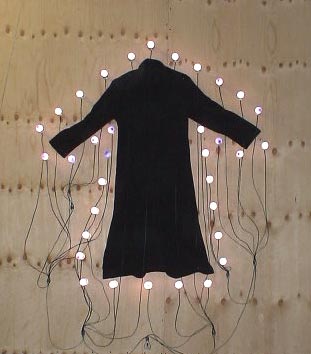26/1/2005
Christian Boltansky
MUAR, Moscow
The exhibition 'Odessa's Ghosts' is about the mythical stories relating to the artist's father and his family. This is the story of a 'dreamt' country; the land of both real and fictional legends. Boltanski tells that at the beginning of every work of art, there is a historical or psychoanalytic event, referring to events that have to be told to be better understood. I Moscow Biennale of Modern Art: Special project.

"Odessa's Ghosts"
I Moscow Biennale of Modern Art
Special project
Curator: Sophie Schmit
Starts at 18:00
The Ruined Annex
Aptekarski Prikaz
This first personal exhibition of Chrisitian Boltanski in Moscow, "Odessa's
Ghosts" is about the mythical stories relating to the artist's father and his
family, who came from Odessa. This is the story of a 'dreamt' country; the
land of both real and fictional legends.
Among these "Odessa's ghosts", there is Boltankski's grandfather; an opera
singer who, after losing his voice, left for Paris. Looking for a job, he was
asked to show his work record book, but as he did not have one, he showed his
hands - and was hired on the spot in a local factory. There is also his
grandmother, originating from a rich Odessa family. She secretly ran away from
her parents to join the man she loved in Paris. He stood there, at the
station, waiting for her, but she did not recognize in this thin worker the
man she loved in Odessa. The only baggage she brought with her was a samovar.
She followed and married him. Soon though, her husband dies of tuberculosis.
She stays alone, in Paris, not speaking French, bringing up her son to become
a famous medical teacher. Christian Boltanski recounts that his grandmother
constantly talked about Russia. She would tell him that they would eat melon
there all year long. As a child, Boltanski only ate Russian meals. His father
kept his children from learning Russian, hoping that they would integrate into
the foreign society, saying: 'You are French, forget it.'
However, one day, all the family headed to Odessa. Boltanski was 13 or 14. Not
far from Odessa, however, his father turned back. All his family were killed
during the war. He no longer had anyone to visit. He wanted to preserve his
memories. A young boy once even rang at their doorbell and told them: 'I am
your cousin'. He stayed for a few weeks and then left for New York, where he
wanted to stage an opera he had written. He never reappeared and they never
knew whether he really was a cousin or not.
It is because of all these personal stories that Boltanski is closely related
to this mythical country. According to him, every artist belongs to a mythical
country, which in his case is Russia. His is an art where life, death and the
existence of God are always present. The Jewish tradition is also in the core
of his work, tradition according to which one can either be God's own son or
miserable. This is precisely the reason why Boltanski's works are not made of
bronze or of marble, but rather of cheap material such as tinplate; material
that fall into decay by themselves. The artist also uses simple and easily
recognizable materials such as coats or photos. To him, everybody is a fragile
and unique character whose memories have to be preserved, just like the
example of his grandmother for which no trace of her existence is left, at the
exception of this samovar displayed in the Moscow's exhibition or the memory
of those who knew her. It is all about 'small' individual memory, that is
opposed to the 'large' collective memory, that of the history books that he
also tells throughout his installations. Each of his exhibitions creates a new
path made of old pieces combined with new works, which setting is renewed
every time.
Boltanski tells that at the beginning of every work of art, there is a
historical or psychoanalytic event, referring to events that have to be told
to be better understood.
'I was born at the end of World War II: my hidden father during the war, the
discovery of the Holocaust, my anxiety about my father's desperation, these
are all elements that moulded me : "Odessa's Ghosts" allows me to celebrate my
personal stories — we have to entertain the dead.'
Christian Boltanski's solo exhibitions have been organised by the National
Center Georges Pompidou in Paris, the Whitechapel Art Gallery of London, the
National Museum of Contemporary Art of Oslo, the New Museum of Contemporary
Art of New York, the Stedelijk van Abbemuseum of Eindhoven and the Museum of
Modern Art of Paris. He has taken part in numerous international expositions,
including Venice Biennale (1972, 1980, 1986, 1993, 1995, 2003) and Documenta,
Kassel (1972, 1977, 1987).
Curator: Sophie Schmit
Assistant Curator: Ekaterina Iragui
Production: French Embassy in the Russian Federation
AFAA: Action française d'expression artistique
The setup of Chrisitian Boltanski's exhibition was filmed by director Pavel
Lungin
________
Dialectics of Hope
I Moscow Biennale of Modern Art
Main project
Starts at 17:30
The Enfilade of the Main Building
Michael Rovner "New works"
I Moscow Biennale of Modern Art
Special project
Curator: Olga Sviblova
The project is presented by the Multimedia Complex of Actual Arts and by the
Museum of Architecture
General partner — Motorola
Starts at 18:30
ImmaterialBox
The Ruined Annex
Aptekarski Prikaz
January 27 - February 28, 2005
Starts at 18:00
Location:
MUAR
119019 Moscow, Vozdvizhenka str., 5
Metro: "Biblioteka Lenina", "Arbatskaya", "Aleksandrovski sad"



